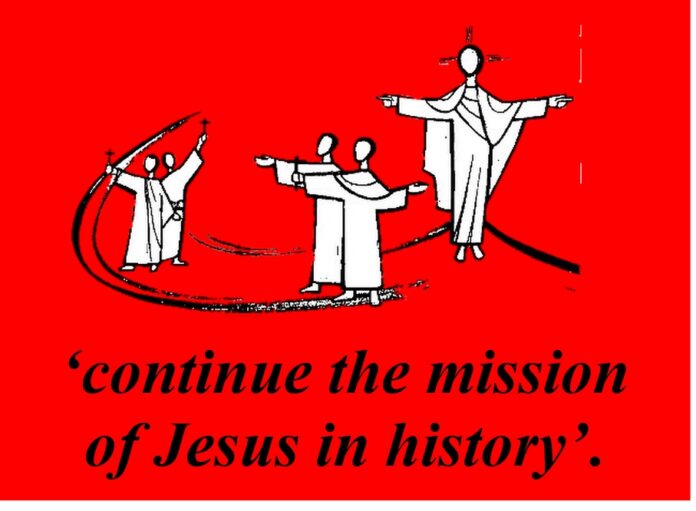Pope Francis, in his Message for the World Mission Sunday 2020, echoes the teaching of Vatican II when he says that the essential calling of the Church is ‘to continue the mission of Jesus in history’.
A Church that ceased to carry out this mission, would no longer deserve to be called Christian. It would be simply a sodality, a group of like-minded people enjoying each other’s company. Emile Brunner, one of the great Protestant theologians of the last century expressed this truth memorably when he stated that ‘the Church exists by mission just as fire exists by burning’. Continuing the mission of Jesus is the responsibility not just of priests and religious but of the entire Church. As Pope Francis again reminds us ‘all baptized members of the Church are sent forth in her name’ to witness to, and proclaim, the Gospel of God’s love. This is how God is able to ‘touch and transform hearts, minds, bodies, societies and cultures in every place and time.’
The mission of Jesus which the Church is charged and empowered to continue is to promote God’s reign ‘on earth as in heaven’. The Gospels introduce Jesus’ public ministry with the statement: ‘The time is fulfilled. The Kingdom of God is at hand. Repent. Believe the Good News’ (Mk 1:14-15, Mt 4:17, Lk 4:43). The Kingdom or Reign of God is not only the central theme of Jesus’ teaching; it is the event that shaped all his actions – his table-fellowship with sinners and outcasts, his healings and exorcisms, his forgiveness of sins. God’s reign, as lived and proclaimed by Jesus, means good news for the poor, healing for the sick, and liberation for the enslaved and oppressed: ‘The Spirit of the Lord is upon me, for he has anointed me to bring good news to the afflicted. He has sent me to proclaim liberty to captives, sight to the blind, to let the oppressed go free, to proclaim a year of favour from the Lord’ (Lk 4:18-19).
During his life on earth, Jesus was particularly concerned with those on the periphery, those who were marginal to, or excluded from, the Jewish establishment of his time: the poor, the blind, the lepers, the tax collectors, those possessed by demons, the persecuted, and the downtrodden. Jesus wanted to end their misery and enable them to have life in its fullness: ‘I have come that you may have life and have it to the full’ (Jn 10:10). Concern for the integral welfare of human beings, created in the image of a loving God, was at the very heart of Jesus’ message and ministry. His healing ministry was always an expression of his compassion. His approach to people was never moralistic or judgmental. He saw suffering human beings and was moved with compassion. And his compassion led him to act, to heal them and draw them back into the web of life-giving relationships. As Christ’s disciples, we are called and sent to be instruments of his compassion in the context of our broken, confused and anxiety-riven world. Within the circumstances of our time, and in light of Pope Francis’ encyclical, Laudato Sí, we are particularly challenged to broaden the scope of this compassionate outreach to include our sinfully abused ‘common home’ and the myriad of living creatures to whom we are connected and with whom we share it.

Creative Commons CC0 1.0 Universal Public Domain Dedication.
An integral dimension of Jesus’ mission was the promotion of peace and unity. ‘Blessed are the peacemakers, for they shall be called children of God’ (Mt 5:9) he declared in his inaugural sermon. Jesus prayed for unity among his disciples, as today’s gospel reading reminds us, and his parting words to them as he returned to his Father were: ‘Peace I leave you, my peace I give you’ (Jn 14:27). When we pray, “Thy kingdom come, thy will be done on earth as it is in Heaven“, we are praying for this peace. True peace is the fruit of God’s Spirit at work among us, and not simply a product of our hands. It signifies the full presence of harmony and integrity in the life of the individual person and of society, and it embraces the entire created world. The Hebrew word for peace, shalom, connotes the idea of wholeness, of being fully healed so that we are “at one” with God, with self, with others, and with all created things.
In fidelity to the mission of Jesus in history, the Church must continue, in season and out of season, to proclaim and promote, in word and in action, God’s reign of love and truth, justice and peace. All of us are called, within the circumstances of our own time and place, to participate in this mission, to be God’s instruments in the transformation of our world. And each of us is invited, not just to pray, but to embody in our lives the famous prayer of St Francis of Assisi:
‘Lord, make me an instrument of your peace:
where there is hatred, let me sow love;
where there is injury, pardon;
where there is doubt, faith;
where there is despair, hope;
where there is darkness, light;
where there is sadness, joy.
May we all work together to establish on earth the peace of God’s loving and life-giving reign.
Fr Michael McCabe, SMA

